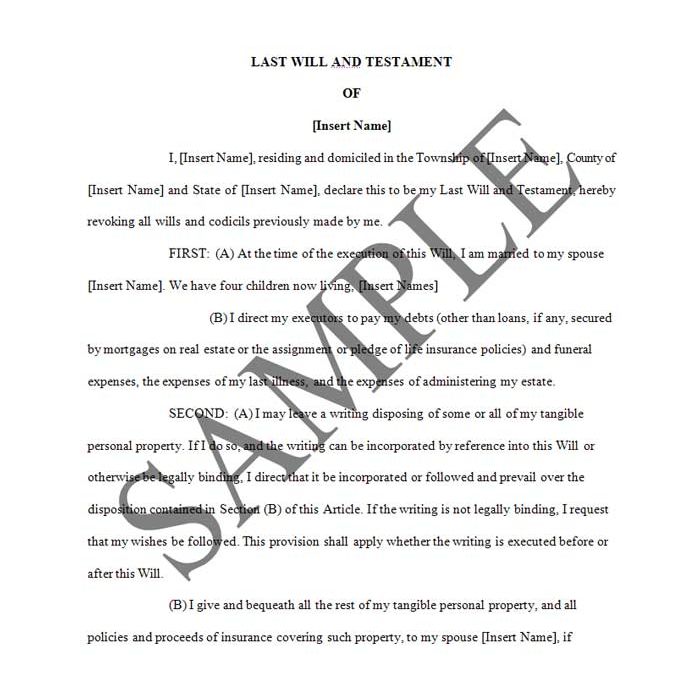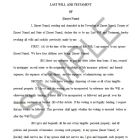Disclaimer Will: If Disclaimer Exercised By Surviving Spouse, Trust For Surviving Spouse, Then In Trust For Children With Three (3) Incremental Distributions (At Ages 25, 30, and 35) (18 Pages)
This is a Disclaimer Will. The testator leaves his/her property outright to his/her spouse, and the spouse is given the opportunity to disclaim some part, all or none of the bequest. If nothing is disclaimed, the entire bequest qualifies for the marital deduction at the first death, but fails to take advantage of the use of the exemption equivalent at the first death.
This is a Disclaimer Will. The testator leaves his/her property outright to his/her spouse, and the spouse is given the opportunity to disclaim some part, all or none of the bequest. If nothing is disclaimed, the entire bequest qualifies for the marital deduction at the first death, but fails to take advantage of the use of the exemption equivalent at the first death.
To the extent the disclaimer is exercised by the surviving spouse, the property so disclaimed passes to a trust for the lifetime benefit of the disclaiming spouse. The spouse is entitled to receive all of the income of the trust, plus principal in the discretion of the trustee for health, education, support and maintenance. When the surviving spouse dies, assuming the disclaimer option has been exercised, the trust property then passes equally to children. If a child has attained age 35, the child’s share is paid outright. If the child has not yet attained age 35, the child’s share is held in trust until the child reaches age 35. The trustee is given discretion to pay income and/or principal to the child on an as needed basis. When a child reaches age 25, the child is paid one-third of the trust property. When the child reaches age 30, the child is paid one-half of the trust property. When the child reaches age 35, the trust ends and the child receives his/her share of the trust outright. Note that the tax clause in this Will directs any applicable taxes to be taken first from the non-marital deduction portion of the estate, if any.
This Form may be used in situations where it is uncertain as to whether the first decedent’s estate will exceed the amount of the federal estate tax exemption, and also in situations where it is uncertain as to whether the combined estates of the spouses will exceed the federal estate tax exemption at the second death. The disclaimer option is intended to be a flexible planning tool to allow the surviving spouse to “fine tune” and fully utilize the qualification for the federal estate tax exemption over two deaths, while at the same time retaining an adequate outright bequest. In small estates, the surviving spouse would likely be advised not to disclaim. In large estates that exceed the federal exemption by a wide margin, the disclaimer should definitely be used. In “borderline” estates that are close to the size of the federal exemption, analysis should be done to evaluate the wisdom and necessity of the disclaimer. The disclaimer trust is designed to allow the disclaimed property to provide a generous income and principal benefit for the surviving spouse without requiring the inclusion of the disclaimed property in the estate of the surviving spouse.
A note of caution: if there is any reasonable doubt as to whether the surviving spouse would disclaim, this technique should not be used. Other planning techniques, some less flexible, may be used to assure that the full federal exemption will be utilized.
Author:
Steven G. Siegel is president of The Siegel Group, a Morristown, New Jersey - based national consulting firm specializing in tax consulting, estate planning and advising family business owners and entrepreneurs. Mr. Siegel holds a BS from Georgetown University, a JD from Harvard Law School and an LLM in Taxation from New York University.
He is the author of several books, including: Planning for An Aging Population; Business Entities: Start to Finish; Taxation of Divorce and Separation; Income Taxation of Estates and Trusts, Preparing the Audit-Proof Federal Estate Tax Return, Putting It Together: Planning Estates for $5 million and Less, Family Business Succession Planning, Business Acquisitions: Representing Buyers and Sellers in the Sale of a Business; Dynasty Trusts; Planning with Intentionally-Defective Grantor Trusts; The Federal Gift Tax: A Comprehensive Analysis; Charitable Remainder Trusts, Grantor Trust Planning: QPRTs, GRATs and SCINs, The Estate Planning Course, The Retirement Planning Course, Retirement Distributions: Estate and Tax Planning Strategies; The Estate Administration Course, Tax Strategies for Closely-Held Businesses, and Tort Litigation Settlements: Tax and Financial Issues.
Mr. Siegel has lectured extensively throughout the United States on tax, business and estate planning topics on behalf of numerous organizations, including National Law Foundation, AICPA, CCH, National Tax Institute, National Society of Accountants, and many others. He has served as an adjunct professor of law at Seton Hall and Rutgers University law schools.
The Siegel Group provides consulting services to accountants, attorneys, financial planners and life insurance professionals to assist them with the tax, estate and business planning and compliance issues confronting their clients. Based in Morristown, New Jersey, the Group has provided services throughout the United States. The Siegel Group does not sell any products. It is an entirely fee-based organization.
Contact the Siegel Group through its president, Steven G. Siegel, e-mail: [email protected].
-
 Joint Living Trust (73 Pages)$129.00
Joint Living Trust (73 Pages)$129.00


